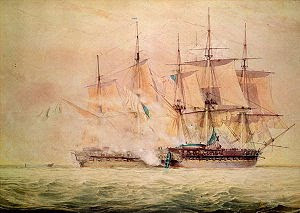Taka-Enterprise Affair
This article is incomplete because it is pending further input from participants, or it is a work-in-progress by one author. Please comment on this article's talk page to share your input, comments and questions. Note: To contribute to this article, you may need to seek help from the author(s) of this page. |
| Battle between Taka and Enterprise | |||||||
|---|---|---|---|---|---|---|---|
| Part of the Taka–Enterprise Affair | |||||||
 HMAS Enterprise (right) fires upon CTT Taka | |||||||
| |||||||
| Belligerents | |||||||
|
|
| ||||||
| Commanders and leaders | |||||||
|
|
| ||||||
| Strength | |||||||
| 1 4th rate | 1 frigate | ||||||
| Casualties and losses | |||||||
|
12 killed 2 wounded |
1 frigate damaged 7 killed 19 wounded 6 captured | ||||||
The Taka-Enterprise Affair was a diplomatic incident which occurred over a number of months in 1796 between Cadenza and Aswick, then a crown dependency of Aquitayne, after the Aswickan ship Enterprise fired on Cadenzan Taka to recover a number of deserters who had joined Taka's crew.
After a brief engagement off the coast of Cadenzan Kamalbia, the captain of the Taka surrendered his ship and allowed it to be searched. Aswickan marines apprehended the surviving deserters, who were subsequently tried and executed. The local Cadenzan earl, Jakúba Kimepra, was incensed, and authorised the ships under his command to raid Aswickan merchant shipping. Taka and Txatka captured a convoy in early October and led it back to port, whereupon Aswick's government called for war with Cadenza. Both sides immediately began preparing for war, until Aquitaynian ambassadors intervened and ordered Aswick to stand down.
Background
Although no formal treaty existed, Cadenza and Aswick were on friendly terms in the 1790s. Both governments supported the monarchist resistance in Berique, whose royal family had fled to Cassonne. A small flotilla consisting of the Aswickan frigates HMS Valentine, HMS Surprise and HMS Stalwart was assigned to roam around Beriquois Kamalbian waters under broad orders to sink, burn or take as a prize enemy merchant and military ships"[1] under command of Commodore Jack Aubrey. While refreshing stores in a port in Cadenzan Kamalbia, a small number of sailors deserted and were taken aboard CTT Taka as crew. Aubrey wrote and despatched a report to the Admiral in command of the Aswickan fleet in support of its allies. Upon receiving this a number of weeks later, the Admiral detached HMS Enterprise under Captain James Munro to seek out the Cadenzan ship and to apprehend the deserters.
Battle between Taka and Enterprise
Commerce raiding
Aquitaynian intervention
When a packet arrived in Jamestown carrying news of the action, the Aswickan Admiralty initially kept a tight lid on the information because the two countries were on good terms. Notes from Admiralty meetings indicate that, though they had significant reservations over Captain Munro's actions, they had quietly prepared for open conflict following Cadenza's retaliatory prize-takings.[2] The Admiralty was unable to stop news of these reprisals from reaching the public, who, ignorant of the cause for Cadenza's hostility, clamoured for war over what appeared to be unprovoked attacks by a previously friendly nation.
After much deliberation, the Prince of Aswick was ready to overstep his authority and declare war on Cadenza. To that end, a flotilla commanded by Commodore Sir Andrew O'Rourke was sent to deliver the declaration and to then harass Cadenzan merchant and military ships on the 11th of March, 1797;[3] however, it was called back before they could start performing their assigned duties. Aquitayne had responded, and had in no uncertain terms ordered Aswick to cease any movement towards war.[4]
Furthermore, Aswick was ordered to pay reparations to both the damage Enterprise caused, as well as pay head money to the families of those the incident had left killed and maimed.[5] Aswick, fearing that Aquitayne would limit a number of the freedoms it had acquired over the past years, quickly complied, thus staving off a full-blown war. As a consequence of this fiasco, the Aswickan Navy began to adopt a less hard-line stance on impressment and searching foreign vessels for deserters.[6]